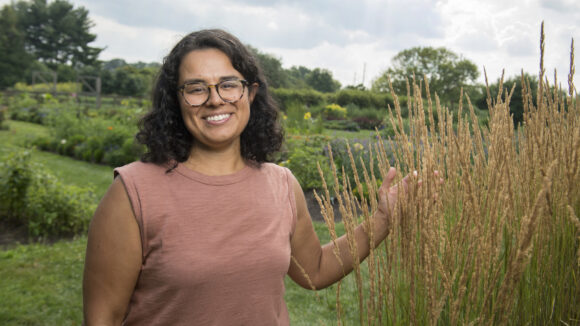
Ariana Arancibia, the new director of Rutgers Gardens, has been working since the summer to find ways to expand access and make it a more welcoming place for communities who have historically not had equal access to nature and public green spaces.
Nick Romanenko/Rutgers University
The new director of the university’s botanical garden wants to expand access and outreach to students and local communities of color
Ariana Arancibia took on the new role as director of Rutgers Gardens and Campus Stewardship to tackle issues of social justice and equity.
She is working to expand access to the gardens for surrounding communities and make it a welcoming place for people of color and other marginalized communities who have historically not had equal access to nature and public green spaces.
The daughter of immigrants from Argentina, Arancibia also wants to serve as a role model for other children with similar backgrounds – letting them know there is a place for them in the field of environmental sciences.
“I want to engage with new communities that may feel traditionally this space wasn’t for them,’’ said Arancibia, who recently moved back to New Jersey after living in New York City and working for NYC Parks GreenThumb for the last several years.
She sees a direct connection between the challenges she wants to take on at the gardens and the recent racial reckoning in the country.
“There is a huge Latinx population in New Brunswick that doesn’t have access to beautiful green spaces and that itself is an injustice,’’ she said. “Historically we don’t talk about these things. We act like they don’t exist, it’s not a problem. I think the pandemic in combination with the murder of George Floyd and the uprising that came out of that opened the flood gates to being able to say we can’t be silent or quiet about these issues anymore.’’
Arancibia, who grew up in East Brunswick and graduated from Rutgers University-New Brunswick in 2010 with a degree in photography and a minor in art history from the Mason Gross School of the Arts, became interested in issues of environmental justice after college. She worked for a year as an assistant photographer before applying to AmeriCorps National Civilian Community Corps (NCCC) to see other parts of the country.
For two years she helped build community gardens and worked in urban agriculture. It was an experience that made her aware of injustices and inequality around issues of access to food.
“It was the first time I had exposure to what food insecurity is,’’ said Arancibia. “There were people in rural areas who were surrounded by agriculture, but they didn’t have access to any fresh produce or food. They had to drive 45 minutes to an hour to the nearest Walmart to get food.’’
After completing her service with AmeriCorps NCCC, Arancibia worked in a farm apprenticeship program before returning to New York City to be closer to her family including her brother, Juan Arancibia, also a Rutgers graduate. She did compost collection, outreach, and education with the NYC Compost Project hosted by the Lower East Side Ecology Center and worked for NYC Parks GreenThumb to provide support to community gardens across the five boroughs – gaining project management and community organizing experience and a deeper understanding of environmental justice issues.
When the job opened at Rutgers Gardens, she saw an opportunity to make a difference.
“I grew up coming here and I felt it was a great opportunity to create more inclusiveness and accessibility to the space,’’ said Arancibia.
“Research has proven that access to nature extends your life and is an important part of your wholeness as a human being,’’ she said. “When you don’t have access to nature it is like not having access to water, like not having access to food. These all should be treated as equally important.’’

